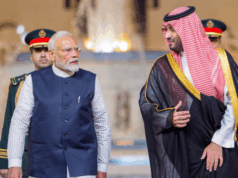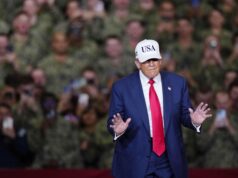Leveraging India’s, economic lever of power — The case for economic warfare

By Allan Rodrigues IN Retd
Throughout recorded history, a nation‘s ability to protect its power and might has always been a subset of a typical ‘equilibrium model’ that has balanced out its many strategic and (often conflicting imperatives) to achieve its aims over a geographic or macro environment.
A typical state might design and use several strategic levers of power to its advantage. These might be political, economic, social, technological, environmental, and many more bespoke levers as yet to be determined.
The three traditional dimensional levers of power used as a deterrent against threats foreign or domestic, have been the geopolitical, socioeconomic and military dimensional levers.
In recent years many countries led by the United States, have introduced a fourth such lever. around information, knowledge and cyber warfare
The recent terrorist incident, at Pahalgam in Kashmir has been ostensibly sponsored by elements of the Pakistani army, (based on claims made by India over the years and not without justification).
The consequent armed response by India, followed by an escalating ‘tit for tat’ in armed exchanges between the two countries has eventually led to a shaky ceasefire, They do beg three questions from any observer of this geo-political quagmire:
1. Post the ceasefire agreement by both parties, has there been any confirmation that Pakistan will dismantle its terrorist camps that they assert are ‘freedom fighters’ ? Or will this be a Pyrrhic victory where India goes back to where it was before Pahalgam? only this time with the same old wine in a new bottle ?
2. Why did Türkiye choose to support Pakistan? Not for nothing, but are they not aware that supporting a failed state is not sustainable ? More significantly no other country in the world, including the usual traditional Islamic caucus of countries came out in support of Pakistan. This should be of great Interest to India, but even more so to Pakistan.
3. Is there an opportunity to change the game and the playing field itself, by fighting on other battle fronts, to break this cycle of incidents and response that has gone on interminably for the last 70 odd years and more ?
India as a responsible nation state has excelled at wielding with aplomb, its geopolitical and military levers of power in the interest of enforcing its will over its backyard in the IOR.
Conversely Pakistan has sought to address its power asymmetry with India in its search for some sort of parity, by developing nuclear weapons, and surreptitiously, by sponsoring terror groups in and around the Kashmir region that they call ‘freedom fighters’.
This is a familiar pattern of rhetoric that is used when nation states sponsor terrorism as a weapon of war.
Therein lies the guts of the problem. There appears to be a mistaken assumption, amongst military planners in India and from within the blogosphere at large, that any response to Pakistan’s repeated sponsorship of terrorist attacks in India must primarily emanate from a military strike in some form, whilst the geo-political fallout is managed by the vast machinery of India’s diplomatic establishments that operate across the globe.
As a democracy, Indian walks a fine balancing act between crafting an escalating series of punitive responses, whilst simultaneously exercising restraint, to ensure that these responses themselves do not spiral into a major shooting war.
Not responding is seen to be weak, and in this day of social media jingoism, can be fatal to the longevity of any politician.
On the other hand, as both India and Pakistan are nuclear armed adversaries, any escalating ‘tit for tit’ series of responses, unless they are perfectly honed and engineered to perfection, may well end up in a calamity of monumental proportions.
Accordingly, future wars can concurrently expect to be fought through the slow, often unseen, leaching and attrition of the wealth and power of a nation state, with its adversaries using every known geo-political, socio-economic, environmental as well as the long arm of its military to topple the ‘equilibrium’ of its challengers from both without and within.
Many of these debilitating forces emanate from the dark corners of the internet and cybersphere, in ways that are constantly reinvented, and often impossible to conjure, or even predict, at this juncture.
There is however, one dimensional lever of power that has been under employed. It is the economic lever, which when used to its full capacity can have a devastating effect on the stability of a nation.
The Economic capital of a state in this day and age is umbilically linked with social capital and social power, which even in controlled states demonstrates the ability of social media to influence the leaders of any nation to act in a particular way is profoundly frightening.
India has not as yet demonstrated its ability or even a propensity, to use this economic lever of power as a weapon of war. Perhaps now is the time.
Pakistan’s military has diverse commercial interests in virtually every sector of the Pakistani economy. This diversity in its commercial interests is not haphazard. The military clearly understands that an economic interest in a single sector could prove fatal.
Accordingly, the Pakistani military has invested heavily in real estate, agriculture, fertilisers, food, IT, cement, mines, water resources, power plants, oil, gas, aviation, media and advertising and even financial services and the insurance sector.
Nevertheless, Pakistan is vulnerable at the level of its economy as a whole. And since the Army owns large swathes of business in every sector. hurting the economy hurts the army.
A targeted strategy against those economic assets that impact directly on the army at the level of the economy itself, could form a wedge between the people of Pakistan and the Army.
They are clearly unhappy with the Army’s control over commerce and trade which creates a consequent zero-sum game of ‘my gain is your loss’ that is deleterious to the well-being of the common people, The way ahead for India is to play them at their own game, but differently.
If they are going to use covert terrorism as an asymmetric response to India’s overwhelming, superiority, India should consider economic war or surreptitious economic terrorism as a counterpoint.
Accordingly the destabilization of their Bond Market and Share Markets are fair game. Using financial tools and instruments to raise the risk and uncertainty levels where the inherent risk becomes a deterrent against the ability of Pakistan to obtain future loans becomes the name of the game.
More importantly, the ability to find arbitrage in those companies that benefit the commercial interests of the army should be the objective. Economic warfare is not usually short and impactful, although it can be.
More appropriately the objective is to engineer a slow leaching of wealth in the face of continual risk and uncertainty that slowly and inexorably creates a downward destruction of a nation’s ability to generate wealth.
Likewise, Arbitrage finds the weak links in the marketplace that attract the sharks who wean out the weak, particularly those companies that are protected because they are critical to the government for one reason or another.
Accordingly, arbitrage, strategies by ‘dedicated actors ‘ using a range of financial instruments, from Options, Futures, long and short positions, unusual movements on the bond markets are but a few examples, as this is precisely where the PAK government finances its deficits.
Using ‘false flag’ companies where the object is instability rather than profitability then become covert facets of economic warfare. These are but a small sample of the vast repertoire of tools available to the economic lever of power.
Will there be an overt and equal response from Pakistan against the Indian economy? Possibly. But even if Pakistan were to obtain its financing for such a response from a third party to engineer a covert response, in the end, the impact of any economic upheaval is directly proportional to the stability of the companies on the public bourse.
That assumption is valid with the smaller private companies in the marketplace at large as well. As Warren Buffett often likes to say (paraphrased) “companies are successful based on their business fundamentals and their ability to generate wealth, not by any upheavals in the marketplace, which are short term rumbles that eventually come right.”
On the other hand the Pakistani economy is riddled with risk and uncertainty across the board. In the end, it must be understood, that economic warfare can be just as debilitating as a full scale shooting war. It is legal when done within the norms of business competition that is prevalent in the marketplace.
And since Pakistan has chosen to covertly attack India through sponsored terrorism, perhaps the makings of covert actions to destabilize its economy might well be considered a legitimate response from India.
At the very least, it would bring Pakistan to a symmetric negotiating table where both parties understand, that any terrorist action sponsored by Pakistan would attract an equal and opposite reaction in the marketplace from India.
In the absence of a kill switch that nips any future escalating series of ‘tit for tat’ armed responses in the bud, arguably, this in itself might well be the ‘general equilibrium’ model that is needed when all else has failed.




